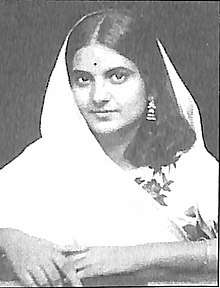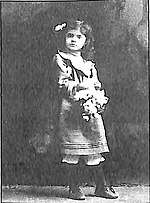Vinodini Nilkanth
| Vinodini Nilkanth | |
|---|---|
 | |
| Born |
9 February 1907 Ahmedabad |
| Died | 29 November 1987 (aged 80) |
| Nationality | Indian |
| Occupation | Professor, writer |
| Parents |
|
Vinodini Ramanbhai Nilkanth (9 February 1907 – 29 November 1987) was a Gujarati writer, essayist, short story writer, novelist, writer of children's literature and translator from Gujarat, India.[1][2] She was associated with several social institutions, especially those dealing with the problems and adversities faced by women.
Early life

Vinodini Nilkanth was born in Ahmedabad to Ramanbhai Nilkanth, a writer and politician; and Vidyagauri Nilkanth, a social reformer, educator, and writer. Nilkanth's primary education was from the Mahalakshmi Training College and her secondary education was from the Government Girls High School. In 1928, she completed her Bachelor of Arts in English as her primary subject and Gujarati as a secondary language. In 1930, she returned to the school to study for the Masters from the Michigan University in Social Science and Education.[3]
Career
She was chief of the Vanita Vishram, an institute in Ahmedabad. She was also the Headmistress of the Municipal Girls High School, Ahmedabad. Vinodini Nilkanth likewise offered her services to the S. N. D. T Mahila Pathshala as a professor. She also wrote columns in newspapers.[3] She was associated with several social institutions, especially those dealing with the problems of women. She was a member of the executive committee of the Gujarat Vidhya Sabha.[4]
Works
Her first published work, Rasadwara (1928), is a collection of personal essays which she wrote in her teens. Nijananda is another collection of her essays.[4]
Aarasini Bhitarma (1942), Karpasi ane Biji Vartao, Dil Dariavna Moti (1958) and Angulino Sparsh (1965) are the collections of her short stories. Her penetration of the human mind, particularly a woman's mind, is revealed in many of them. Kadalivan is a novel written by her. Her Parajit Purvagrah is a translation of Jane Austen's Pride and Prejudice, and Sukhni Siddhi, a translation of Bertrand Russel's The Conquest of Happiness. From 1949, she wrote a column Ghar Gharni Jyoti to a daily, Gujarat Samachar, which became very popular.[4] Her journalistic writings as a columnist have been published in five volumes: Ghar Gharni Jyot part 1, 2, 3 & 4 (1955, 1958, 1964 & 1969). The last one Ghar Diwdi (1987) was published posthumously.[3][4]
Her contribution to Children's literature includes Shishuranjana (1950), Mendini Manjari (1956), Balakoni Duniyama Dokiyu, Safarachand (1964), Padchand Kathiyaro (1964), etc. Her miscellaneous works include Gharno Vahivat (1959), Bal Suraksha (1961) and Muktajanoni Bhoomi (1966).[3]
Awards
Her short story collections Dil Dariavna Moti won the Gujarat Sahitya Sabha Award, and her work Angulino Sparsh won the Gujarat government award.[4]
See also
References
- ↑ "બધી વાતે અગ્રેસર વિનોદિની નીલકંઠ". 1 April 2009. Retrieved 21 July 2018.
- ↑ "Vinodinee Neelkanth: Life and times of a Gujarati writer who dared to be unconventional - Indian Express". archive.indianexpress.com. Retrieved 21 July 2018.
- 1 2 3 4 "સવિશેષ પરિચય: વિનોદિની નીલકંઠ, ગુજરાતી સાહિત્ય પરિષદ". Gujarati Sahitya Parishad (in Gujarati). Retrieved 8 September 2018.
- 1 2 3 4 5 Amaresh Datta; Mohan Lal (2007). Encyclopaedia of Indian Literature: Navaratri-Sarvasena (4th ed.). New Delhi: Sahitya Akademi. pp. 2950–2951. ISBN 978-81-260-1003-1.